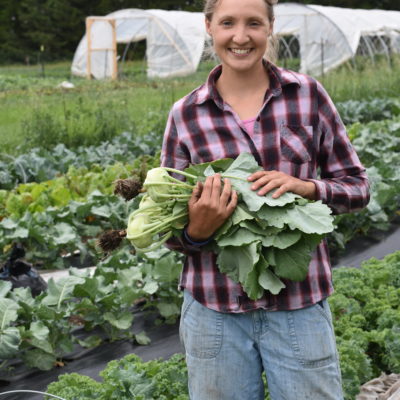By Olivia Smucker
Like the produce she grows, Lillie Eisenbeis’s farming roots run deep.
Following in the footsteps of her parents and grandparents, Eisenbeis now runs a farm centered around community sustainable agriculture (CSA) on her grandmother’s property in Freeman, South Dakota. Together with her husband, Andre, who also comes from several generations of farmers, she owns and operates Prairie Roots Produce (PRP), which serves farm-grown vegetables to the nearby community 18 weeks of the year.
Freshly into its second season, PRP now has 40 shares that go out weekly to either be picked up at the Freeman farmers’ market or delivered to customers in Sioux Falls. The latter group came about with the help of Eisenbeis’s father-in-law, whose dairy farm, 5th Generation Farm, delivers to a customer base there. Since the milk van was already going out weekly, it was easy to access an eager customer base that now accounts for two thirds of PRP’s shares.
Besides the 40 types of vegetables that the farm produces, Eisenbeis also sells additional items with the shares through a program she calls “Produce Plus”. New this year, share buyers can opt to pay an extra $30, $50 or $100 to use for more novelty items like bread, eggs, whole wheat flour or soap, provided by either Eisenbeis or her parents. She also includes a newsletter in each share with news about the farm and recipes for people to use based on that week’s produce.
However, Eisenbeis didn’t always think this would be her career. When she was young, she didn’t really enjoy her parents’ line of work, but before long she caught the farming bug. She later completed a degree in Agriculture at Dordt College and spent the summer of 2017 with her husband doing World Wide Opportunities on Organic Farms (WWOOF) in France.
WWOOF offers people the opportunity to travel to organic farms around the world with housing provided in exchange for labor dedicated to maintaining the farm. Eisenbeis appreciated the view into the lifestyle and cultural differences of international farming and the ability to “cross paths with people from different parts of the world.”
This kind of worldview served them well as they started PRP, seeing as “farming is a lifestyle” rather than just a job. It also provides a unique kind of interdependent support system within the community. The community relies on the farm for the produce and the farm relies on the community to keep it running.
“Farming is hard to do without that support system,” said Eisenbeis, who also emphasized studying and understanding the customer base available to get at the best direct marketing. She said that finding out what people are wanting to buy is an effective farming strategy, much more so than only producing the vegetables that are personal favorites. Being able to fulfill those requests creates a more interconnected relationship between farmers and their customers.
This kind of interconnectedness is what Eisenbeis loves most about her CSA career, particularly in relation to how her faith in God connects to growth in the garden. In her opinion, the Bible has a lot to say about Creation and our connection to nature, so it’s easy to carry that connection into a farm to table context, serving the earth and the people being sustained.
“A lot of what we produce isn’t us, it’s what God has given us,” said Eisenbeis. “We are co-creators partnering in what’s already going on in creation. We are a part of something cosmic.”
